Soaring water rates, entire cities out of water, polluted water supplies, ghastly volumes of water lost…And the problem is growing. Can we ease water's overburdened central infrastructure and rescue stranded end-users? Well, the cohort of investors joining to support our revolutionary strategy to handle water "at the edge" sure think so! And, we believe they've found the ultimate answer for investor uncertainty… What is it? Find out here in the replay!
Transcript from recording
Opening
Riggs: I wanted to discuss, sort of zoom out a little bit and talk about the evolution of the company and how our role is evolving into what we call an innovation hub. And you can tell that we are a changing organization because of course, we're trying to make change happen in the water industry, which is not easy.
But our previous historical model was to constantly build value. The problem with it is it was a bulky model and inevitably one or the other division was going to be a redheaded stepchild and not get the attention it deserved. It was also a constant burn. About a month ago we moved to a different point of view where we successfully launched Water on Demand with its Water4Us program. And we said, Well, wait a minute, let's make that what we do.
And in this model, OriginClear again is the mothership that enables each one of these to be very tactical, very focused, and then OriginClear gets management fees, which enables it to be, as a mothership, to be profitable and itself go on to the Nasdaq. So what I like about it is, is, is it creates this cool launchpad role for OriginClear, which is very unique in the water industry. We have them in Silicon Valley we don't really have in the water, right?
So, OriginClear has that role and eventually gets monetized as such and has a big chunk of each one of these companies for its pains. But then each one of these companies becomes and we end up with, you know, half a dozen public companies of which OriginClear has a big piece. So the OriginClear investors and sweat equity players like you are rewarded there.
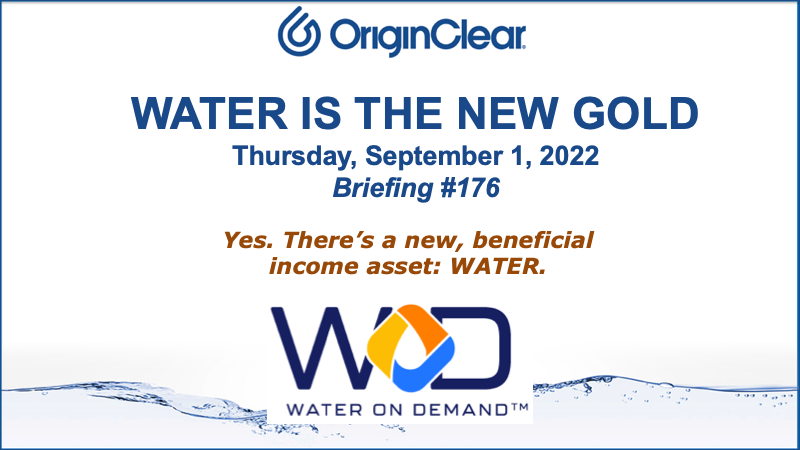
Introduction
And welcome to the CEO briefing. This is one of the new clips that we're producing the team, Josh Summers and his Monarchy team with the leadership of Kevin Pruett in content is producing these fantastic clips as a better way to syndicate, distribute the content of these briefings, which is quite massive.
So with that, I'm going to go ahead and open up the briefing itself. Here we go. All right. So we are September 1st. Whew! Who knew? Right. And this is the 176th weekly briefing, and we're talking about a new beneficial income asset water. And we're going to be talking a lot about assets in this briefing. As usual, we have the Safe Harbor statement, which you know well.
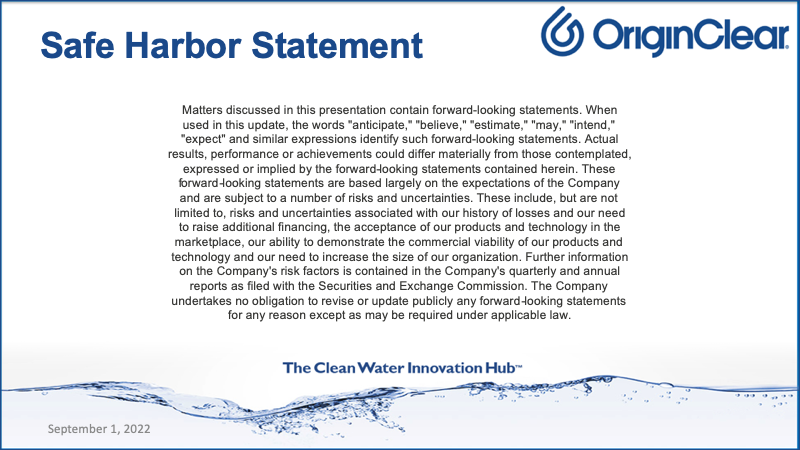
Featured Presentations
And now we're going to do a quick excerpt from a podcast that we did earlier this week, which I think you will find really fascinating.
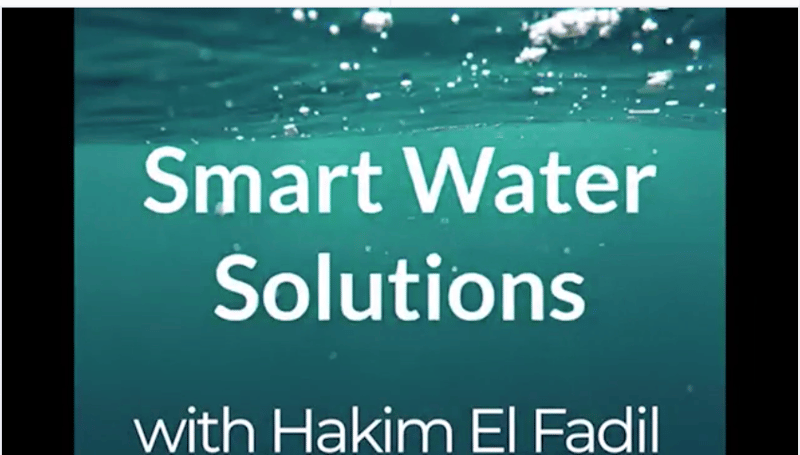
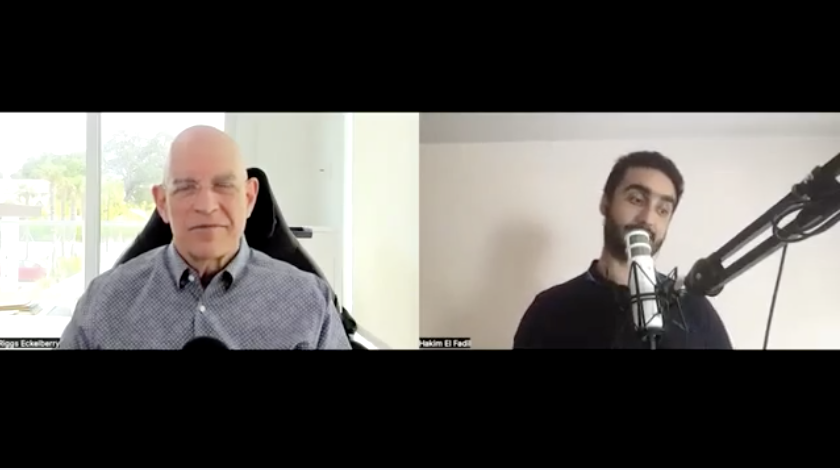
Start of presentation
Hakim: So Riggs, I mean I consider you as one of the people that really has a footprint in the water industry.
Riggs: Wow!
Hakim: So I would like to understand what is your love? How do you get to that level with water? And you could have moved to several industry, but you are dedicated for water.
Riggs: Hakim, it's a pleasure to be on your podcast and I hope I measure up to the expertise of your audience because I'm only a CEO and my chief engineer knows so much more than me, but I will do my best. We know that water in the world is not in a great place. 80% of the sewage is not treated at all. 70% of the industrial toxic waste is never treated at all.
Now, you and I know that where you are in Belgium, where I am in Florida, it's not that way. We treat most of our water, but the rest of the world is really bad. Africa, the subcontinent of India, etc. Those are very poor practices and they don't have the capital to fix it. Truth is that even in America, we have a big capital problem where infrastructure is falling behind all the time.
Hakim: That's the question that I still couldn't answer. Maybe you can. I mean, I do have some rough idea, which is what is the limits? I mean, I would say economical limits or unsustainable limits where it makes sense to use decentralized and where it makes sense to use centralized units. So when just for the audience to understand just an idea of where.
Riggs: Ok, it's a very good question. The first thing to know is that, of course, the United States built its infrastructure without thinking about recycling. And so it's a one way system when the water, dirty water travels, for example, in Los Angeles, from Glendale to the El Segundo treatment system, which is beautiful. It only goes one direction into the ocean. It does not go back to Glendale. It's not set up that way. And they've tried very hard, but you've got to build a whole new grid to bring it back. And that's hard.
Much simpler is to treat it where you are and now you can reuse it where you are. So recycling becomes much more viable. Decentralized. But. You don't need to do everything at the edge. One big thing that I believe decentralized water will not do is create potable. I don't think it's necessary.
For example, let's take a brewery. They're generating, they're using about seven or eight liters of water per liter of beer. Should they reuse that to make beer? Well, first of all, people don't like it so much. So but about 50% of that water can be used for wash downs, for steam vessels, for accessory use in the brewery. And now you have recycling. So there's an opportunity to get more turns out of the water. And that's really important in places that are, that are water scarce, right? Is to get more use out of the water before you throw it away.
So two things then is recycling is important. But number two, it's probably fine to descend the water to the central treatment plant for the final polish. The people at the edge should take advantage of that. Well, the city is willing to accept treated water to this standard. We will create that standard and send it to them and everybody is happy. So you're right that there's a limit to what the edge should do, but it's already a huge load taken off the center.
Hakim: Why is it so slow, the water compared to the tech industry, where their portfolio change every three years or every four years.
Riggs: Right. These are very important questions. The first one, of course, is that let's not forget that water industry is responsible for public health. So there's a natural conservatism. And for example, on the drill pad, there's definitely conservatism because they don't want to stop operations. So there's a tendency to go, okay, wait, wait, this is new or it's not, it's not proven. Let's make sure it's okay. And that's perfectly natural and normal.
But the other big thing is let's take an analogy, for example, with the hotel industry or the taxi industry which were invaded by Airbnb and Uber, and they were very slow moving industries and a hotel 50 years ago. Same hotel. Nothing much changed, but Airbnb blew up the model and I think that the water industry, its model needs to be blown up, and that really is all about CapEx.
We acquired a company in 2015 as part of our move to build a water company. And what we learned was that water, you know, we just experienced these incredibly long water transactions. You know, it takes months and months to get a water deal done. And that uses up staff time. When I first entered the water industry, I was told, well, it's a very low margin business. I'm like, why is it a low margin business? Because time, the cost of these endless negotiations, permitting, all these things that go on, it can take years, literally. Right.
And so how do you get around it? And really, we had to confront that problem. In early 2020 because COVID was a great time for us all to look at, "What are we doing here? Are we doing the right thing?" We had a huge backlog of quoted projects that were not moving through fast enough. How do we speed it up? We finally realized, hey, wait a minute. What about if we create water as a service?
And therefore all somebody has to do is sign a piece of paper and their water is treated. We basically become the stand in for the city, for that client, right? And we, they're on the meter. Then, they know about it. They know how to pay by the meter. They've always paid it by the meter. They're just going to keep paying by the meter.
And that eventually became Water on Demand, which is in the water industry, as you know, it's called DBOO, design, build, own, operate. We had been at DB Design and Build only, which has these problems of low margins, slow transactions, and you're constantly... Big cash flow problems because high CapEx. All those problems are real in design and build. And in fact, we've done a good job of it. Recently we reported that we almost tripled our revenue Q2 2022 over Q2 2021. So we're doing really well.
But it's not the final solution. The final solution, in my opinion, is to do what Hi-Tech did with a brilliant thing about high tech is they made everything a service. Look at Microsoft Office. It used to be $120. You bought it. You're fine. Today you pay $19, whatever it is a month, you're paying more than $180 over time. But you are more you're better served. There's One Drive, there's The Cloud. There's all these these great tools that are built in,Teams, and you just use them, right?
And you pay and so it's actually more satisfactory for the end user and it's more profitable for the provider. Microsoft's making much more money from office as a service versus office as a product. And so I think that's inevitable. It also enables the water industry to say, don't worry about your installation. We're going to maintain it. Just do your business.
Because as water treatment moves to the edge, we move away from water experts. The men and women running a brewery. They want to make beer. They don't want to treat water. And they don't have water experts on board. And so they just they're very happy to go, "Fine, there's a box. I'm on a service contract. That way I don't have problems with the city because the city doesn't want to take all my water out." All that noise has gone away.
And it's maintained. So I can just get on with my business because business people think of water as a distraction, not as a goal. Right. They're not in the water industry. And that's very important to remember. So we're enjoying a tremendous amount of excitement from. I'll give you just one example, a community that is building, it's a nonprofit building a community. Of tiny homes.
And and we were working with them on their water system that they knew they had to build a big water system. And we said, Well, why not just put it in your your fees? Just do it as an OpEx. And they went, okay, easy, easy solution for them, because they don't have to raise seven $750,000 for that 75k, 75000 gallons per day system that they're looking at. So, it seems like something to do.
Now. What we learned is that people who are already committed to the capital route, they're done. They're going to do the capital route. But if you catch people early enough when they're still trying to figure out the problem they were, they'll be willing to look at the solution.
Hakim: And I think the beauty of this, it's one I was just thinking, going back when I was working with end users the now how you never get somehow in the end user who has very good knowhow as an OEM. So you always rely on the OEM and the OEM also lose the track whenever we approach the OEM, the OEM also, they don't have very good understanding on the technology which is inside their system that they have built. So there is so much knowledge is lost between end user OEMs and the component suppliers.
I think there is a kind of here value, like the way how you describe it is kind of Airbnb. You really optimize, you give what you need, you pay for what for your wastewater and you benefit from I assume really high expertise for every, because wastewater is completely different field and the wastewater for beer, I bet is different than wastewater from milk factory and etc..
Riggs: Well, these are very good points. The first one is that. You talk about technology? When we started looking at how to do what is a service, so we're creating this thing we call Water on Demand. And we made a decision, number one, to not try to build all the systems ourselves because we can raise money much faster than we can build systems. So we chose to sacrifice the revenue from building and maintaining systems and give them to local water companies.
And we have a partnership now with Envirogen, first partnership, they're a European company with an American footprint, and they do operations and maintenance and they'll support the system. They're very good people and we plan to grow that network. Now, and by the way, just as a side note, that's kind of our supercharger network. That's kind of our little barrier entry, because now we have relationships with people that rely on us for deal flow business from us. We say, Here, here's the money. Go build a system, here's your client. But they also bring us clients. So it's a very healthy channel relationship. That's number one.
Number two is we decided to standardize technology. We have a division called Modular Water Systems and a very smart chief engineer, Dan Early, who is an early champion of decentralization. Long before, 15 years ago, he was doing decentralized systems, and he has patents that we've licensed for Water Systems in a Box™. Right. But secondly is he's done a lot of work to standardize what goes into those. And so we have a product line.
If you go to www.modularwater.com, you'll see it has the products that we build are pretty standard. And he has actually invested in configuration software that is part of our intellectual property that specs these very rapidly. So now you have potentially a much more uniform network of systems and that creates uniformity. We get away from that problem we're talking about, which is a kind of a patchwork of solutions, and you standardize them as much as possible.
Hakim: Okay. So to the end user, pick up something which it's working right now.
Riggs: It's proven to work.
Hakim: Exactly. So when you say the patent in a box, which means it's not like an IP on a paper, but really it's a solution, complete solution.
Riggs: Right. So, we, Dan has five international patents that are centered around this idea of it's not a technology revolution, but it's a new way of packaging water systems, which is this modular envelope. And it's much more acceptable to the water industry to accept a new way of packaging a water system, the whole new way of treating water, the water industry, look, there's plenty of technology already in the water industry. It is a technology rich industry.
We know what to do about many things. We know what to do and we know how to get the solutions. And so our idea is let those solutions simply be productized. So that because we have two divisions, one is progressive water, which is custom and can do anything you say, what do you want? We'll do it. And they're super versatile. They're amazing people. They've been around for 25 years. We bought them in 2015 and then we created in 2018 Modular Water, which is products and it is not custom.
Hakim: I think you one of your podcasts you mentioned about, um, there is still a gap in investing in water, so I would like to learn more from you. So what are the gaps that you see in the water space and how could be solved in terms of financing or investing in water?
Riggs: Well, in the oil industry, we have something called the Master Limited Partnership, which is a way for regular investors to invest in a basket of energy properties, pipelines, petroleum and natural gas. And these are they have good long term royalties. It's a great way to build generational wealth and it complements big oil. So MLPs master limited partnership will never replace Exxon, but it is complementary.
This doesn't exist in water at all. There has not been direct investment in water systems. If you want to invest in water, you can buy shares in Veolia or American Water Works, Evoqua, etc. or you can invest in an ETF, exchange traded fund. But you can't invest in the actual water like an oil well. And we realize that that's the water industry needs finance. I mentioned earlier that the infrastructure is very underfunded. And so we're running $75 billion a year behind on water infrastructure.
Well, that's directly affecting quality of service, and we're seeing that show up all over America. Flint is just the tip of the iceberg, this water problems all over America. And this is an opportunity to bring the regular investors as a new cohort of investors. So it's not JPMorgan capital, it's not venture capital, it's not municipal bonds, although all of those are good.
It adds another group, which is investors like you and me. Now, currently we only take in accredited investors, which is basically the top 2% of all income earners are accredited. But I'm a strong believer in a democratic process. So by the end of the year, we will definitely have an unaccredited way for people to invest in Water on Demand, and that's exciting, too. So, what we're hoping is that anybody from $500 to $500000 can invest in Water on Demand and see a return benefit for them. But they're also doing wonderful things to make sure these new decentralized water systems happen.
Hakim: And this decentralized system. Are you? I think if I understand correctly from your portfolio, you are not only active in us but outside the Us.
Riggs: In general. We want to make sure that we do a good job in the US. Now, as I told you, Water on Demand is delegating all the building and maintaining of systems. But what we do want to do is we want to spread Water on Demand financing centers to other places like Dubai, Singapore, etc. in partnership with finance organizations in those locations to do Water On Demand for those areas.
And I think that's a good way to go is to spread the Water on Demand structure internationally so that. Again, we're not going to ourselves become a fund in Dubai will simply do a partnership, right? And that is, I think, the way to expand. What I'm focusing on right now is putting in that layer of the DBOO, the actual water as a service activity, get that established, create that reality. We are different.
There's other people in water, as you know, doing DBOO. Seven Seas is a big player that does an island economies. A very good company called Cambrian Innovation which has a lot of beverage business. But Seven Seas is funded by JP morgan Capital, Cambrian is funded by VC. And they also, they don't accept money from you and me. So that's a big differentiator. And also, we've chosen not to do very, very super large systems, but rather more the middle class where the bulk of the systems will be. They'll be in the 500000 to $2 Million range capital. I think that's going to be the growth industry.
But to make money from that, it's hard to be a big company and make money from small systems. And that's where I think our network of local operators is going to be able to work with this. I see it as a revolution. I really see it as something that's going to transform the water industry. And at this point, we just have to keep our nose facing forward and execute. But it's going well.
Investors love it. Investors, you know, here's the thing. All these assets... Look at oil and gas and look at real estate and they're all messed up. There's all these political things going on. They're basically exhausted. Even crypto is in trouble. So all that stuff's got to, you know, how do you invest in that? You can't! I don't know how to invest in blockchain. I have no idea. I used to know and now I don't.
So water is a new asset. It's at the beginning of its run. It's relatively stable. We're not going to have suppression of water treatment as we've seen suppression of fossil fuel energy. So it has a good potential for people to invest in and people are looking for better ways to invest their money. So we're getting tremendous uptake on this Water on Demand offering and it's really exciting.
Hakim: Awesome. Thank you very much Riggs. Thanks a lot.
Riggs: Thank you so much Hakim. It's been a great pleasure.
Hakim: My pleasure. Thanks a lot.
End of presentation
Summary
Riggs: So as you can tell, Hakim is a water professional. This podcast, Smart Water Solutions, focuses on interviewing people in the water industry. And he contacted me. He said, Your OriginClear has a lot of visibility in the water industry and we want to get you interviewed. So as you can tell, it was a little bit more technical, right?
He mentions OEM. So what's an OEM original equipment manufacturer? That's actually somebody who builds stuff under their label, right? Like, for example, if Tesla is an OEM, right. And if people sell products to go into a Tesla under the Tesla brand, they're making an OEM sale. So that's just that. And I mentioned CapEx, which is capital expenditure OpEx, which is operating expenditure. Those are pretty obvious anyway. That is kind of the the beginning of view of the day.
Audience Participation
And, OK, "Is OriginClear offering to help in Jackson, Mississippi." And Ken says and he's right. "Large cities are very resistant to change in model." We are working, as you mentioned, as this podcast mentioned, we are working at the edge. The problem with helping places like Flint, like, "Oh, feel free to give us stuff, that's not a problem!" And so everybody is giving stuff to Flint, Michigan. Well, there's a place for that.
But we're, we believe that the problem with the Flints and Jacksons of the world and I could get into that story, Jackson, Mississippi and Las Vegas, New Mexico and so forth, is that the central infrastructure's overwhelmed. And so we want to unload it. That's the solution. Not rushing in and trying to help Jackson, Mississippi, which has already got a bunch of people helping and the federal government and this and that and delighted to get your donations. So that's kind of the the territory we've staked out. All right. Let's continue here.
So What Do I Invest in Now???

The stock market... now what?
Okay. So what do I invest in now? Let's take a look at the stock market. Look at U.S. Billionaires, poor guys and gals actually is only guys on this list. So some have lost more than others. Um. But and they're going to be fine. I want you to know that they will be paying their bills next month. But that's a huge change. Right. And this is because, as we know, it'll Reserve Chair Powell said we're going to get tough on interest rates.

So let's take a look here. The Dow Jones Industrial Average, here's the one month look at that bang. Nasdaq composite, which is all the stocks listed on the stock exchange. Bang. Standard and poor, which is the 500 large companies listed. Again, look at almost identical patterns on the one month chart. Right. So back in about ten August, things were going okay and then... I don't think so. And then it just fell off a cliff.
Let's take a look at the Russell. The Russell 2000 is small caps, but it's not immune by small caps. And we don't mean a company like ours, which is more like a microcap. Small caps are more in the $50-100 million range revenue or higher. Then this blockchain block, which is also blockchain, not doing so great and gold. This is the weird thing. Gold should be doing great with all this inflation. What's going on? Gld gold. And it too is is seeing a lot of a lot of trouble.
Let's take a look at ARKK, the innovation fund. And they're really good at disruptive innovation like Apple, etc. They've made a lot of money for people. It's not doing so great. Now, this one here elements RJI is the Rogers International Commodity Index and had a weird, weird day. Look. Look at the far right thing. It went plummeted and then came right back. That was weird. It overall does not show as bad a trend because commodities are kind of doing better, but it's not great. I'm not confident about that.
XOP, which is oil and gas exploration. Know you'd think every, oil companies are making so much money from oil and gas. So what's going on? Well, there's a reason for that. We'll get into it. All right.
So then what about real estate?
So then this was something I advertised earlier this week. The new home sale collapsed. You see that blue line? Basically just going down, down, down. And it's not stopped going down and the inventory keeps rising, according to this commentator James Ryan. First time in US history that buyer demand has tanked against builder inventory. And he says the 2008 was a walk in the park and that was not fun. I was, I was in 2008 and I held on to my house, but it took years for me. I finally sold it once it was in the green, but it took years for it to come back. So that says a lot.

Then...oil and gas?
All right. What about oil and gas? Let's take a look at that. They are actually starved for capital there. Here's an article in The Epoch Times about oil and gas producers are facing a shrinking supply of capital. Again, it's weird because there's so much money being charged for fossil fuels, but banks are unwilling to provide asset based lending facilities, ABLFs, to the oil and gas industry. And this has a lot to do with the efforts to get off of fossil fuels, which I think are wonderful. But the problem is that it hurts oil and gas, right?
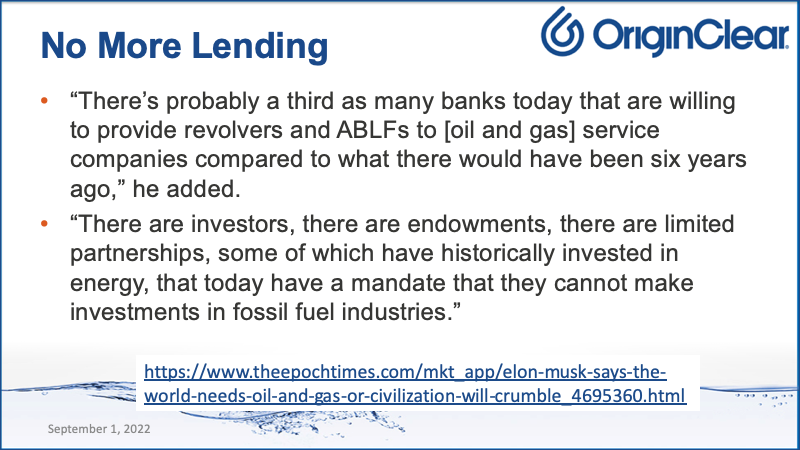
Only a third as many banks today compared to where they would have been six years ago, and various investors, so forth that have invested in energy are not allowed to do it in fossil fuel industry. So and this is from an article in the Epoch Times about Elon Musk, who said the world needs oil and gas or civilization will crumble. I'm not getting into that story, you can look it up yourself. But the point is, is that oil and gas as an investment would seem to be good, but it's highly politicized.
What about bitcoin and cash?
What about Bitcoin and cash? Well, there's a good little clip here that I'm going to play, give you a sense of what that's all about. And it's just a quick one minute clip, but I think you'll enjoy it. So I went ahead and excerpted this from a podcast.
Start of presentation
Dan: Geopolitics and.Empire is joined by Army aviation veteran Mike Hobart, who Bitcoins and is communications and marketing manager at Great American Mining. Welcome to Geopolitics and Empire, Mike.
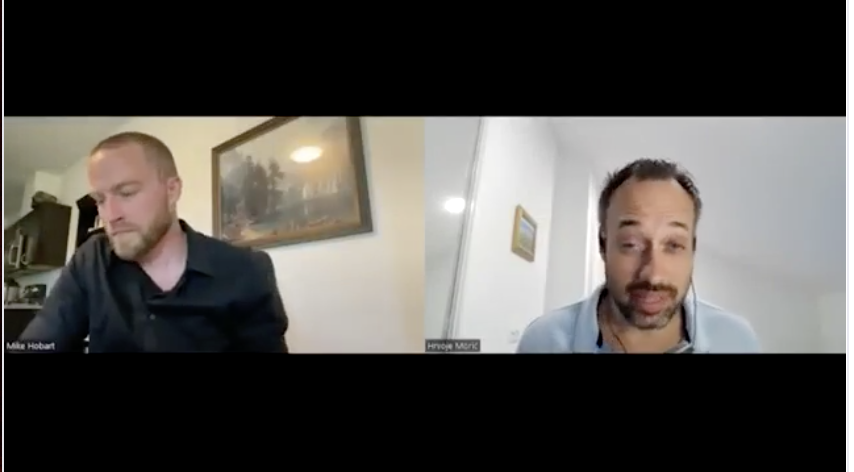
Dan, Thank you for the intro. I do. I do. I would say that I identify as a Bitcoin maximalist. But in that regard, I'm not somebody who only puts money in. I don't see Bitcoin as the only investable asset. I think that's ridiculous. But at the same time, right now I don't see much that is worth putting my money into other than cash and bitcoin. That's like I'm not going to put it into bonds because the US government and a lot of other governments across the world are proving that they like you, just like they're not worthy of that kind of trust.
Because if you're going to put your purchasing power somewhere, you have to trust that they're going to do something good with it to the point where you're not going to lose your purchasing power. Right. And we just. Like the US, these governments think that they're just going to print and print and print and print the currency away and think that everybody's going to trust them for it. Like this is ridiculous.
End of presentation
Riggs: So that's just a quick clip. And this was a lot in this particular podcast. So we're talking a lot about the central bank digital currencies and how Bitcoin might interact with it. There's a lot of uncertainty and I personally am long term bullish about Bitcoin. I think it's a wonderful thing. But even he was like, Well, yeah, you know, obviously he's what he calls a Bitcoin maximalist. So what that means is but he's not the kind of person a lot of people in Bitcoin only invest in Bitcoin. Well, they've had a hard time in recent times. So not so great. It's again, a problem with crypto at this time. All right.

Water as a commodity
So let's take a look at water. Water is a commodity. All right. Well, this is a story about Jackson, Mississippi, that was brought up earlier by Will Porter and. What the heck happened? Well, it's what we've been saying for a long time, which is damaged infrastructure. They 150,000. By the way, Jackson is beautiful, beautiful town. I used to go there for I had a project there while I was in the tech world and beautiful town. And of course, water everywhere. It's very, very rainy and very fertile.
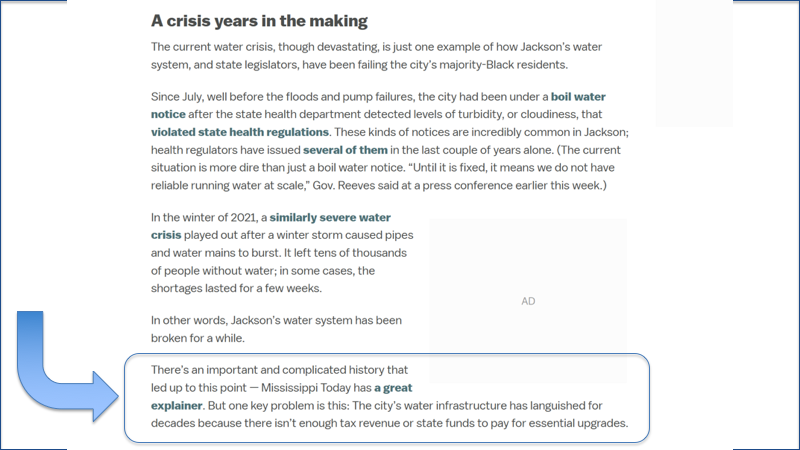
But they just simply had a lot of disinvestment in water systems and says right here that the city's water infrastructure has languished for decades because there isn't enough tax revenue or state funds to pay for essential upgrades. This is what I've been saying since 2016, which is it's forced decentralization. The central infrastructure system is so far behind, it's crazy.
And Las Vegas, New Mexico, also big problem. They had a big fire and now debris contaminated the water and critically low. They're getting bottled water stores, etc., etc., and trying to get the federal government to pay for a reservoir. They just need to use less water again. They just don't have a lot of fallback. Right. So this is the problem with central infrastructure and we don't see it a lot, but it's starting to show up in the headlines, isn't it? All right. So I thought I would play a quick clip from The Economist, which gets into water as an asset as they understand it, which is you'll see in a second.
Start of presentation
Gill Plimmer: Water is life. But as the world warms up, it's also increasingly becoming a commodity. For example, the NASDAQ VELES, California Water Index Futures was launched in 2020, allowing investors, farmers and municipalities to bet on the food cost of water in California and hedge against any price rises.
Australian farmers are also trading water and a $1.4 billion market and allocations from the sprawling Murray-Darling River Basin.
Landholders are free to use or sell their parcels of river water, the value of which rises or falls according to the price of crops and whether any rain is forecast.
Critics of these financial models say that clean water is an essential human right and should be paid for by the state. They also believe that speculative trading could distort water prices for everyone, meaning some people may struggle to afford it. Others believe that putting a price on water and encouraging private models of ownership will ensure its conservation.
One of the biggest experiments in water privatization has taken place in the UK. In 1989 the government sold off the entire water system of England and Wales to limited companies. More than 30 years later. That system has been criticized across the political spectrum.
Chief executives have been awarded hefty pay packages. Shareholders, generous dividends and investment and infrastructure has not kept pace with population growth leading to sewage, flooding and pollution failures.
Just 14% of rivers meet the minimum European standards for water quality, for example.
The largest market for investors may be in providing new technologies such as desalination or recycling plants. Desalination plants can be costly investments because they use a lot of energy to run. But the global industry wants to power a fifth of new desalination plants using renewable energy between 2020 and 2025.
Other innovations include the seawater greenhouse, which uses seawater and solar power to create cooler, more humid conditions for greenhouse cultivate crops in arid regions.
Half of the world's population is expected to be living in water stressed regions by 2050.
The race for water has only just started.
End of presentation
Riggs: And there's another one here. I'm going to continue right along here about water rates.
Start of presentation
Commentator: Look at the difference between these two water bills in Illinois, in the town of Fort Heights. Water costs $85 a month on average, while an hour away in Winnetka, the average is only $24 a month. What's interesting is that in Winnetka, household income is ten times what is in Ford Heights. Why is water so expensive for poor Americans?
Let's set the record straight. Water prices in the United States have been getting more expensive overall for the past decade, while food prices have gone up about 20%, about the same as inflation. Water and sewer bills have increased by over 65%. But the weight of higher water bills isn't shouldered evenly by everyone, and this is no accident.
We're going to look at how something as basic as water has become a luxury for poor Americans. But to get there, let's go back in time a bit to see how water infrastructure in the US has been set up. Before the 1800s, people drank from streams and wells. But as American cities grew, it was clear that a system was needed for getting water to these densely populated areas.
In New York City, the Manhattan Company built one of the country's first public water systems, sending water to homes through underground pipes made of hollow wood. This wasn't a public service, though. Only the rich were able to afford it. But it made the Manhattan Company so much money that it was able to go into another lucrative business. You might know it today as JPMorgan Chase. One of the biggest banks in the world.
But back to water. Water systems continue to pop up nationwide. But in 1908, something big happened. Jersey City became the first American city to start routinely disinfecting drinking water. Thousands of towns and cities followed its example, and very quickly, the spread of waterborne diseases dropped dramatically across the country.
Problem is, as life changing and essential as modern water infrastructure is, it's still sold as a commodity the way it was when the Manhattan Company was digging pipes in the 1800s. That means today thousands of families face foreclosure every year because of unpaid utilities like water bills. In fact, low income Americans can spend up to 12% of their income on water costs.
Ms Flowers: It impacts the way they eat, how often you cook, what you cook, how much water you consume. You know, part of being a healthy person is that you have to consume so much water a day. It changes the way you live your life. And I think that a lot of people should realize that when they take that for granted, they're in a better place than the people that can't.
Commentator: So how different could water bills be? Take a look at the suburb in the Chicago area. This area gets its water from Lake Michigan before the water to reach the town of Indian Head Park. It goes through three resellers. That's why people who live there pay more for their water than anyone else in the Chicago area.
Ms Flowers: When we monetize it and make it a for profit business, instead of saying water is life, we have those unintended consequences.
Commentator: Speaking of unintended consequences, back in the 1970s, water in many places look like this.
Newscaster: Florida's growing population keeps pressing against the edges of the swamp. Detergents, pesticides, sewage, Industrial waste pouring into the water exhaust. Fallout polluting the air. Jet oil spills polluting the water.
Commentator: In response, Congress passed the Clean Water Act and the Safe Drinking Water Act. These laws set national standards for water and sanitation, but there's a caveat. It's up to local governments to meet these standards. And the federal government doesn't regulate the prices to customers. Even though 90% of American water utilities are owned by local governments. Private companies are usually subcontracted to manage tasks like water treatment, pipe repairs or sewage collection.
Some local governments have even sold off their water and sewer systems to private corporations for millions of dollars. The result of this is a mishmash of more than 150,000 independently run water systems and almost 15,000 treatment plants, which partially explains why there just no uniformity when it comes to water prices.
Subjecting water utilities to the free market and regulation loopholes also explains some of why poor neighborhoods pay more. But it's not the whole story. Marginalized communities often live in areas farther from water sources, so transporting water to them is more expensive. And those areas are also where local governments have been less likely to invest. So the cost of fixing broken pipes is also added to residents bills because there's no legal cap on water prices in many places, they often go up with costs.
Ms Flowers: And part of this is also poverty. And poverty in this country just self-perpetuates. You know, when it manifests everything around, it is not to help people lift themselves up. It's to keep them impoverished.
Commentator: Think about how easy it is for you to just turn a tap and get clean water and how your life would be different if that wasn't the case.
Ms Flowers: For an example, it shows up in Alaska where people are using honey buckets for sanitation. I mean, they never got infrastructure in the first place. And then it shows up in places where people have don't have access to clean water, like in Denmark, South Carolina, that has been polluted with by industrial pollution and has not been addressed or it shows up in places where they have little or no water or places like Jackson, Mississippi. You know, who are those people? They're indigenous. They're people of color. They're marginalized communities. They're poor communities.
Commentator: The lack of investment in these communities means they suffer from more frequent violations of the Safe Drinking Water Act, and things stay unfixed for longer.
Ms Flowers: One of the main causes of the structural inequalities that are embedded in our system, that tend to favor people that already have, you know, wealth or people that are in a position to afford to pay for lobbyists to to get preference. Preferential treatment. And those people that don't have it are, tend to be, tend to be at the back of the line if they're in the line at all.
Commentator: But even if you're lucky enough to not live in a community that pays more for less. Why has water been getting more expensive for everyone? First, a lot of water pipes are old. In fact, the average American water pipe is older than most Americans, and old pipes leak every day. Roughly 6 billion gallons of treated water is lost through damaged pipes. That's enough to provide 36 days of drinking water for every American. Second, because companies don't sell water as an essential service, they often prioritize short term profits over repairs, pollution cleanups or climate adaptations. And that leaves us with more of these old leaking pipes.
Newscaster: With the water crisis in Newark, New Jersey, where thousands of residents remain unable to drink their tap water.

Newscaster: Residents in Willowbrook say the water from the Sativa water district is severely contaminated.

Newscaster: Now to a big story in the North Bay, where a pipeline break has the city of Benicia requiring all people and businesses to conserve water immediately.
Newscaster: Nearly 2000 water systems used by 6 million people were excessive. Levels of lead were detected in the past four years.
Commentator: Third, the federal government is investing less and less in water infrastructure, so those costs are being pushed onto the consumer. So if we know that water utilities are a broken business and facing a crisis that most impacts marginalized communities, then what's the solution?
The U.S. water supply system is failing at its job of keeping water affordable and accessible to everyone. Some countries get past this by treating water less like a commodity and more like a human right. For example, Ireland guarantees free water to everyone, and when the government proposed charging for water in 2014, protests broke out. The government was forced to shelve those plans and water will remain free until 2024, after which residents will only be charged for excess use.
Ms Flowers: I think the premise of all of this should be the water is water and sanitation is a human right.
Commentator: And human rights shouldn't depend on where you live or on profit margins.
Ms Flowers: We have to remove the inequities that exist in our system, the unfair policies, the policies that penalize poor people, the policies that penalize rural people, the policies that penalize people that are not in a certain income bracket. We need to have people at those communities that are impacted to be part of developing whatever plans are there so that we can eliminate those blind spots that we don't have when we're trying to dictate policy in places we've never been before.
End of presentation
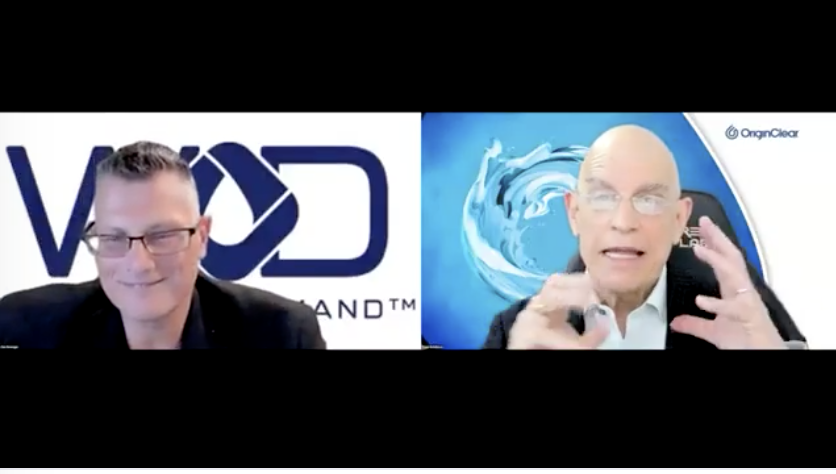
Freewheeling Discussion
Riggs: This is a fascinating, fascinating story. And what does it have to do with us? Well, I'm going to bring in our one and only Ken Berenger for the free wheeling discussion. So here's what's really, really interesting. That last video and also the Financial Times one was really talked about. All the problems besetting central water. And water is a right. I want to be able to get clean water and to flush my toilet. The problem is that these 150,000 water systems are overwhelmed supporting agriculture and industry, which is like 8580 7% of all the load. If we take away that load now, they can do their job.
Solve it at the Source
Ken: So. So there was a couple of things in there that I thought was really wonderful. So that graph and the graph that shows core inflation and food prices and then that looks familiar. Right? You found that obviously from there where they they found the exact same graph that was number one. But then it also talked about consistently how this place has got land and this place has insecticides and this place has industrial waste.
It's as when I when I speak to investors, they go, what are you doing about drinking water? I go, Look, if you solve the it's an upstream problem. The downstream remediation is far less. Right. There's so much stuff in our drinking water from what's happening going on upstream. So our solution really does you are going to you are going to fix we do have drinking water solutions now, but we're going to fix drinking water by not causing the by preventing the pollution the pollution discharge at the source of pollution in the first place.
Accountability
It also talked about it's the money. So it's doing all this. It's the money, stupid, right? It talked about that. It talked about how the pipes are old. It's essentially what it's it's very invigorating and validating to hear what we've been yelling about for years that our water systems, ancient. It's leaking like a sieve. They said every American for 36 days. I think it was right. Another term I heard was to supply the top ten water producing water using cities in the country year round. So take your pick.
Right, both of them. An astronomical, astronomical number. The things that we've been talking about, it was nice to hear someone completely unrelated to us relay those messages, you know, a little bit out of sequence. But it just comes down to this. We are on to the most vital commodity on the planet when people are talking about it as a human right.
And we can have that discussion. But the reality is, is right now is. We need to make it so it doesn't kill people. Right. So instead of charging the homeowner to turn on his tap to have clean water, and that's what they're talking about. How does the homeowner avoid having to get clobbered with water costs, that long pipe, that long system of pipes? Why it costs more money out in the couple of miles out of Chicago. Well, that's because of the resellers.
Well, it's the same thing. While you can't deliver clean water, you can't have a water treatment plant at a farm in the middle of nowhere. It's just one user. They couldn't pay for it. The reality is, is that the way to avoid the homeowner from being penalized to get clean water is charge the water. The industrial water users at the source of the like you said, the guys who make the who use the water clean the water. Really what you're saying is the guys who pollute the water.
Riggs: Correct.
Ken: Clean the water. So this is an operation.
Riggs: It's accountability.
Ken: It's an operational expense that's already cutting their cost for water use in half anyway. Right.
A Better Solution
Riggs: Making it work better for them. It's a better package because they get to manage inflation and all that good stuff. Of course, it also ensures quality of service for them, and on top of it, it frees the central water systems to do their job. Now they can do their job, and this is important.
Ken: And you can actually have more that you can you can build in areas where you couldn't previously build. The other, the other thing that I thought was kind of an expansion on what we talked about, it's the money, stupid. These people are deploying capital to run their business anyway. You were talking about Envirogen. There's that one customer we are going to probably do that deal with as it clears up, but they're spending $1,000,000 a year carting away human waste.
So think about it like this for the investors who understand, well, how does this help? How does this work? They're spending $1,000,000 just to not get shut down.
Riggs: Right.
Ken: If you put $1,000,000 system, which, by the way, the size of their operation would require something, a fraction of the size of that. But let's just say it's $1,000,000 system. You could put $1,000,000 systems, and that's funded by you and me as investors. Right. Charge them a half a million dollars a year. Half a million dollars a year. And they'd be like, thank you. Thank you. Right. Because now you just instantly saved me a half a million. And again, there's also several turns on the water.
Riggs: So it's better use of the water and they have less. They outsource it. Problem goes away.
Ken: It's a major water conservation, but the end user, he just knows he's saving a bunch of money. So what we're going to be able to do is tap into look, we're going to tap into the environmental agnostics. Yeah. You know, if it cleans the environment, that's okay. This thing. This thing makes money hand over fist, so they're like, okay, I'm down with that. Right?
Riggs: Well, and even if you are an environmental missionary, you're excited about it.
Ken: Of course.
Riggs: Remember in 2019, I went to Aspen, to Aspen Renewable Energy Conference, ARE Day, about this whole issue. But what we found was we can't help the central cities. That's really for the government and for the cities.
Ken: Not yet.
Riggs: No, no, no. Our mission is at the edge. Is at the edge. We're not the government. We're not going to go and go to Washington and do a lobby thing. What we can do is help is connect investors to water projects. All right.
Audience Participation
So Coletta Sharpe is very happy with what we're saying. Bill Lucas, "Very informative presentation this evening." Keith Roeten, "You all have the most forward ideas I've ever encountered." Thank you, Keith. All right, Brant Houston says, "Do you have pro forma projected financials for each of your water demands showing the ROI on an investment if the projections are met, i.e., what's the reason I should invest?" Let me tell you have the most dense forecast and pro forma is once you start listening to Manual walk through it.
Ken: I know. I know.
Riggs: It's incredibly detailed now. It's all on our investor section of the website. We've gone ahead and posted a video of my presentation of our strategic presentation, which shows the forecasts and you can tap that. And of course, Ken will be happy to show that to you as well. So all those forecasts which are summarized have a wealth of data underneath it. We've done the work. We know this thing can work and it's been validated working with the Envirogens of the world. We're actually validating all these prices and so forth. So I wanted to summarize here. So what what we have here is a real dilemma for investors. I don't know what to invest in. I'm looking at my wife's for one. I'm like, What the heck?
Dan: What did I say to you yesterday? Where the hell do I put my money? Right.
Riggs: But there's this asset called water, which has not been damaged. It's being divested. Remember the how AT&T became all the Baby Bells because it was the divestiture of AT&T. Now we have the divestiture of government monopolies in water and now this is the new income bearing asset.
Ken: I'm glad you mentioned that. I'm glad you mentioned the breaking up of of of the Ma Bell monopoly created billionaires across from sea to sea. The divestiture of water is many many many times larger.
Riggs: It's far larger. At&t was just one company. It was a fine American phone system. But the fact is, is that a very similar revolution is happening right now and we're monetizing it. So this is your solution to where to invest contact Ken. We have I'm going to quickly give the contact information for those of you who, by some mystery, don't have the contact information.
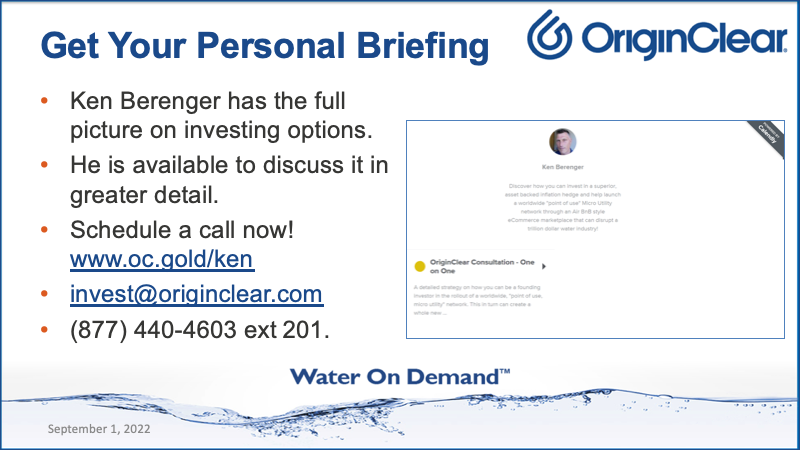
Call Ken
Here we go, oc.gold/ken in your browser and you can schedule. Email to invest@OriginClear.com or call 877-440-4603 ext 201. With that, I want to thank everyone. Ken, I want to thank you. I think we are going to be helping American investors at a time when they are being screwed. It's a horrible time. And fortunately, there's a new kid on the block, which is this fresh, fresh faced player called Water, which has not been mauled by the 2008 recession or the 2022 "non-recession."
Ken: Right. And and it didn't get an announcement that BlackRock was buying up a quarter of all the homes in the country just stopped.
Riggs: That's that's a big piece of information.
Ken: Super spooky, right?
Riggs: It's crazy.
Ken: So all the old rules are broken. So we have to we have to make new rules.
Riggs: Well, new asset class. That's the way to do it. Fresh take. Everyone, thank you very much. It's been super great. Coletta says thanks and we really want to thank all of you. Do talk to Ken about what we're doing. It's super exciting. We love having you. We will have more on this next week. And let me tell you something. There's some amazing stuff happening. You hear about pipes and water loss. We have a booming business in water conveyance and we're going to talk about it next week. Thank you all.
Ken: Goodnight.
Riggs: Have a great weekend and see you again soon.
Register for the next Insider Briefing: HERE
%20250px.png?width=250&height=53&name=OriginClear%20Logo%202019%20(RGB)%20250px.png)




